Conferences
Max Weber Conference in Cerisy (France)

PENSER LES SOCIÉTÉS ET LES POUVOIRS AVEC MAX WEBER VERS UNE "SCIENCE DE LA RÉALITÉ"
[THINKING ABOUT SOCIETIES AND POWERS WITH MAX WEBER TOWARDS A “SCIENCE OF REALITY”]
Conference in Cerisy-la Salle from September 26th to October 2nd, 2022
See Website
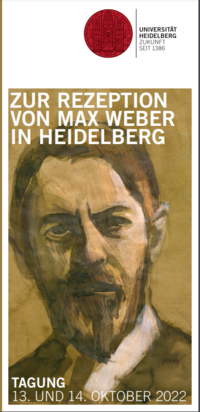
At the reception of Max Weber in Heidelberg
Conference of the Heidelberg University Archives
on the 13th/14th October 2022
See Website
[Translate to English:]
Seminario Internacional: Max Weber y su Legado: Sociedad, Política y Cultura /
Max Weber and his legacy: society, politics and culture
International conference in Madrid, November 3-4, 2022
See Website:
Headlines
+++ The magic of Donald Trump +++
„The Magic of Donald Trump“ unter diesem Titel bespricht Mark Danner in der Mai-Ausgabe von “The New York Review of Books” Trumps Manifest “Crippled America: How to Make America Great Again”. Eigentlich geht es ihm aber darum, das Erfolgsrezept der Personenmarke Donald J. Trump zu entschlüsseln. Wie schafft es der ungehobelte, politisch inkorrekte Statements abgebende Präsidentschaftskandidat 24 Millionen Amerikaner vor die Fernsehbildschirme zu locken und als einziger Gegenkandidat Hillary Clintons in die Wahlen zu ziehen? Danner erklärt es auch mit Max Webers „Charisma“-Begriff von den exzeptionellen Kräften und Qualitäten einer Person, die dazu führen, dass ihr Menschen blind folgen - im Falle Trumps bereits zu Beginn einer von drei republikanischen primary voters. Trump verbreite in seiner narzisstischen Faszination das Gefühl, er könne alle Probleme, auch die politischen, lösen, wobei sich in diese „monomania“ autokratische Ansprüche und neo-faschistische Züge mischen. Aber wie Weber schon schrieb, ist „Charisma“ eine Kategorie der „wertfreien Soziologie“, die uns helfen soll, eine Herrschaftsbeziehung zu analysieren, unabhängig von den moralischen Qualitäten des Charismaträgers.
Max Weber Complete Edition News
- Just published: MWG I/18: „Die protestantische Ethik und der Geist des Kapitalismus. Die protestantischen Sekten und der Geist des Kapitalismus. Schriften 1904–1920“, edited by Wolfgang Schluchter in collaboration with Ursula Bube. Tübingen: J.C.B. Mohr Paul Siebeck 2016, XVII, 763 pages.
The revised version of Max Weber’s famous study on the “Protestant Ethic and the Spirit of Capitalism” is presented in this volume along with the almost completely rewritten essay on the sects. Weber regarded both essays as being an integral part of volume I of his “Collected Essays on the Sociology of Religion,” which he prefaced with “Preliminary Remarks.” Here he spelled out the thrust of his entire collection: to identify the distinctiveness of Western, especially modern Western, rationalism and explain its rise. In the editor’s introduction, the broader context of these three texts is described while in his editorial report, the genesis of this revision is demonstrated on a textual basis.
See Publishing house Mohr Siebeck - Soon in print: MWG I/12 „Interpretive Sociology and Freedom from Value Judgments. Writings and Speeches 1908–1917”, edited by Johannes Weiß in collaboration with Sabine Frommer. Publishing date 2017.
The texts compiled in this volume document and illuminate the path of thought upon which Weber turned to sociology comparatively late in life. The volume is a collection of writings, speeches and contributions to discussions on methodological and theoretical problems which originated in this frame of reference between 1908 and 1917 and, with a few exceptions, were also published.
See Publishing house Mohr Siebeck - Soon in print: MWG I/13 „Hochschulwesen und Wissenschaftspolitik. Schriften und Reden 1895-1920“, edited by M. Rainer Lepsius und Wolfgang Schluchter in collaboration with Heide-Marie Lauterer and Anne Munding. Publishing date 2016.
This volume contains more than 100 statements by Max Weber on universities and academic policy. It documents his work as a professor in Freiburg, Heidelberg and later in Munich and his involvement in the Verein für Sozialpolitik (Association for Social Policy), the founding of the Deutsche Gesellschaft für Soziologie as well as his speeches at the Deutscher Hochschullehrertag. In these, Weber expresses his concept of the role of a university teacher as described subsequently in his famous lecture on “Science as a Vocation.” This volume contains texts from the period between 1895 and 1920, thus comprising close to Weber's entire lifetime as a scholar. It also documents Weber's personality and his enormous commitment to implementing his ideals, in particular freedom from value judgment.
See Publishing house Mohr Siebeck - Volume II/2: Letters 1887-1894, edited by Rita Aldenhoff-Hübinger in collaboration with Thomas Gerhards and Sybille Oßwald-Bargende. Publishing date 2016/17.
Max Weber wrote more than 200 letters between 1887 and 1894, a time which saw him juggling busy professional and academic careers. The volume of correspondence he produced in this time provides not only a rich seam of biographical detail, but also charts the development of Weber's powers of political judgement. - Volume III/3: Public Finance. Lectures 1894-1897, edited by Martin Heilmann in collaboration with Cornelia Meyer-Stoll. Publishing date 2016/17.
Alongside theoretical and practical national economics, public finance was the third pillar making up the economics curriculum during the 19th century. On being called to Freiburg, Max Weber was also obligated to lecture on the subject of public economics, something he did in 1894/95 and 1896/97. This volume opens up to scholars at large the handwritten notes Weber used as memory prompts, providing for the first time the opportunity to understand how and with which emphases Weber mastered the task of teaching a subject foreign to him. The editors attempt to reconstruct the author's intended train of thought, find out at which points he merely received known subject matter, and locate where Weber's own ideas, indicative of his later sociology of domination and social economics, shine through.
New Publications from the Project Environment
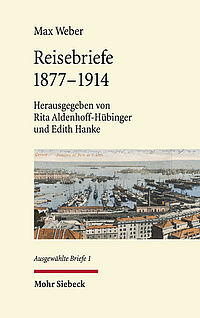
After completing the letter edition of the Max Weber complete edition, the editors Rita Aldenhoff-Hübinger and Edith Hanke compiled the travel letters and republished them in a handy and beautifully illustrated reading edition. On his travels, Max Weber is not only a precise observer and reporter, but also a linguistic artist. Like a painter, he puts his pen to work and creates colorful images for his addressees at home - mostly his mother Helene Weber -: the barren nature of Scotland in its fine color gradations, the stormy sea or the vibrant New World of New York. The introductory essay by Hinnerk Bruhns shows that it is a particular pleasure to read.
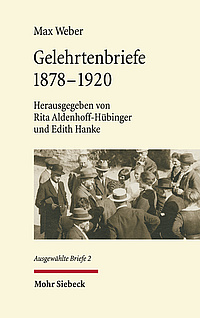
A few weeks before his unexpected death, Max Weber turned away from politics in disappointment and confessed to the chairman of the German Democratic Party: "The politician should and must make compromises. But I am a scholar by profession." In this way, Weber himself lays a thread through his eventful scholarly life, the different facets of which Gangolf Hübinger follows in his introductory essay. The editors Rita Aldenhoff-Hübinger and Edith Hanke have selected the striking, self-speaking letters from the over 3,500 letters from Max Weber, which are carefully edited and commented on in the Max Weber Complete Edition, and have divided them into the areas of "lifestyle", "politics" and "science", although there are always overlaps, depending on the addressee of the letter. The selection of letters is intended as an invitation to get to know Max Weber in his self-descriptions and his “special” points of view. And perhaps the selection will also encourage you to pick up the MWG letter volumes and make further discoveries.
See Publisher's Website.
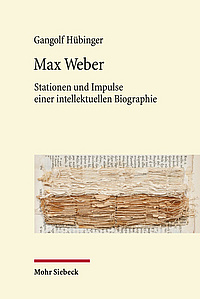
Gangolf Hübinger, editor and intimate expert on Max Weber's work, focuses his reflections on Max Weber's biography on the scholar-intellectual. Weber experienced, analyzed and shaped the upheavals of his time. "Two character traits stand out in Weber's intellectual biography, scholarly rigor and civic radicalism."
See Publisher's Website,
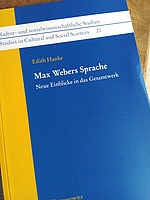
The book is an attempt to approach Max Weber through his language and not through his often controversial disciplinary attributions. Langauage is his means of expression and his working instrument. Weber is the great coiner of terms: logical, hard, precise. He is the precise, eloquent observer, the humorous, male-coarse contemporary, and he is the vulnerable person who can usually only express his feelings through literary or musical metaphors. Edith Hanke wrote this book after completing the editing work. She deals with the various text genres of the MWG in a relaxed manner. Her conclusion: Reading Max Weber is often tedious, but never boring.
See Publisher's Website.
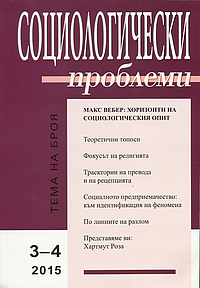
A Max Weber issue was published in the Bulgarian magazine “Sociological Problems” (double issue 3-4, 2015) at the beginning of 2016. In this issue, Johannes Weiß and Kolyo Koev present the contributions to an international Weber conference that took place in Erfurt in July 2014. The latest results of global Weber research are made available to the Bulgarian specialist audience through the translation.
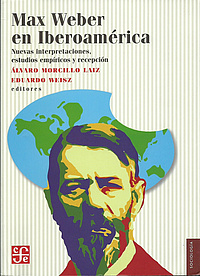
Max Weber en Iberoamérica. Nuevas interpretaciones, estudios empíricos y reception [Max Weber in Ibero-America. New Interpretations, Empirical Studies and Reception], ed. de Álvaro Morcillo Laiz y Eduardo Weisz. México: Centro de Investigación y Docencia Económicas, Fondo de Cultura Económica 2016.
The expanded conference volume “Max Weber en Iberoamérica” has been published in Mexico. As the subtitle indicates, this volume, edited by Álvaro Morcillo Laiz (Mexico) and Eduardo Weisz (Buenos Aires), has three goals: It provides a representative cross-section of Weber's work and its interpretation in Spanish (mostly as translations of original English or German contributions). At the same time, it offers an overview of the reception and application of Weberian questions in Central and South America. The contributions not only survey Ibero-American Weber research, but also aim to give Spanish-language interpretation of Weber new impulses for the 21st century.
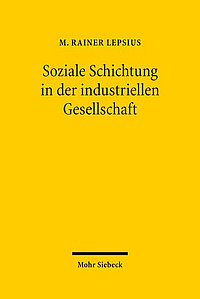
M. Rainer Lepsius, Soziale Schichtung in der industriellen Gesellschaft. [Social stratification in industrial society.]
With a foreword by Oliver Lepsius and an introduction by Wolfgang Schluchter. –
Tübingen: Mohr Siebeck 2015.
A posthumous edition of M. Rainer Lepsius’ habilitation thesis unpublished before.
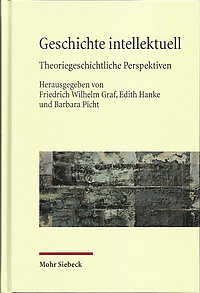
Geschichte intellektuell. Theoriegeschichtliche Perspektiven,
hg. von Friedrich Wilhelm Graf, Edith Hanke, Barbara Picht.
Tübingen: Mohr Siebeck 2015
„Geschichte intellektuell” reflects on history in its relevance to the presence and to current political actions. 28 authors of history, social and cultural sciences debate basic questions of their disciplines in an open dialogue with neighboring sciences and cultures. All entries are referring to Gangolf Hübinger and his understanding of historical sciences as an intellectual profession.
For more information please see publisher
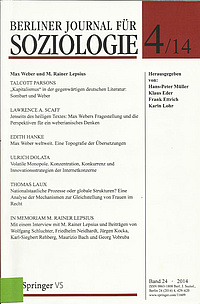
Max Weber and M. Rainer Lepsius (special edition) in: Berliner Journal für Soziologie, vol. 24, issue 4, 2014
